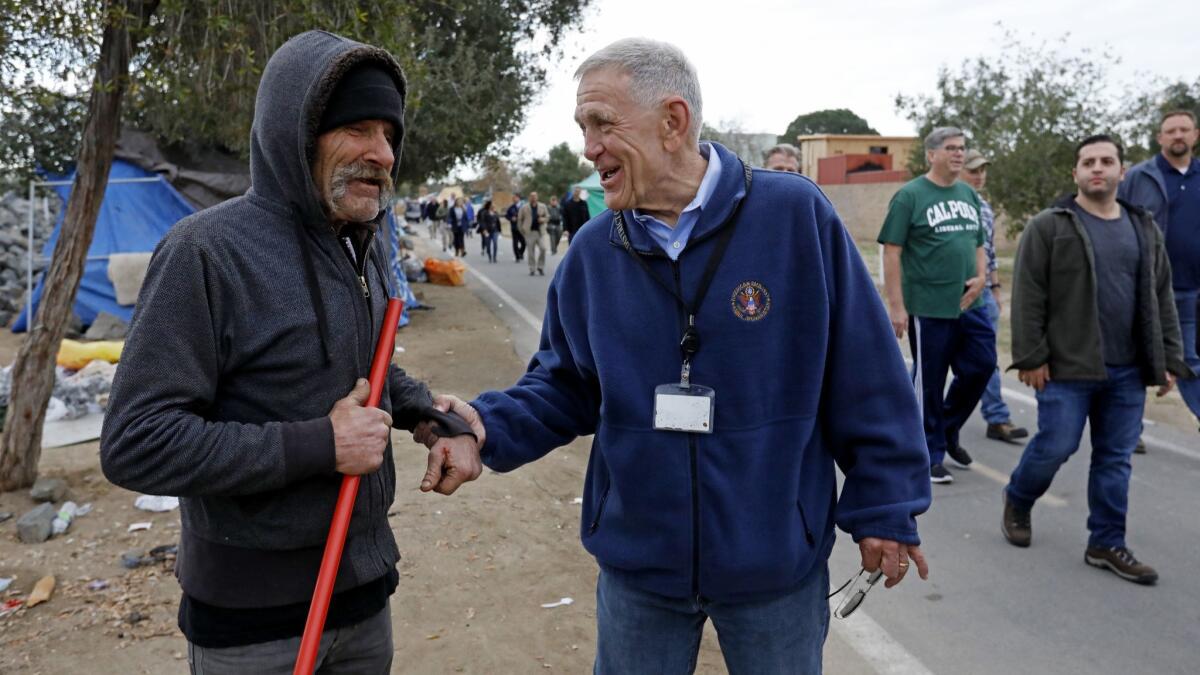Laguna Beach settles with homeless advocacy group, avoiding prospective lawsuit
- Share via
The city of Laguna Beach has reached a settlement with Orange County Catholic Worker, a nonprofit that provides food and aid to the poor, avoiding prospective litigation against the city on behalf of its homeless population.
The settlement, approved Monday by U.S. District Judge David Carter, calls on the city to work with trained personnel to offer available shelter placement; assess the needs of people with disabilities to provide appropriate placement and reasonable accommodations; and ensure that the number of beds available at the city-funded homeless shelter — the 45-bed Alternative Sleeping Location at 20652 Laguna Canyon Road — doesn’t fall beneath 60% of the city’s unsheltered individuals identified in the countywide 2019 Point in Time count. The January count determined that Laguna Beach had 71 unsheltered people.
The city said in a news release Monday that the provisions “reiterate many policies and practices already in place within the city,” and it called the settlement proactive. Orange County Catholic Worker has not sued the city.
Additionally, the agreement allows Laguna Beach to continue to “enforce applicable laws under appropriate circumstances,” according to the release.
No monetary damages or attorney fees were exchanged as part of the settlement, the city said.
Brooke Weitzman, an attorney for Orange County Catholic Worker, said the settlement ensures that Laguna Beach will take a “healthcare first” or “trauma-informed” approach before ticketing or arresting a homeless person.
“If a person does not have access to the ASL, or it is not appropriate for them, they will not be ticketed for being outside,” Weitzman said in an email. “Instead, the city will work with healthcare to get appropriate assessments and placements for those individuals.”
Weitzman added that a person also must have access to a dispute resolution process if he or she disagrees with a recommendation. The person can contact an attorney, and the city and attorney would work to resolve the issue. If it can’t be resolved, the dispute would go to court.
If a recommendation is deemed appropriate for the person and he or she doesn’t take it, law enforcement could cite or arrest the person.
“We are really pleased with this settlement, and it is consistent with this [City] Council’s approach to matters of this kind,” Mayor Pro Tem Steve Dicterow said in a statement. “We want to balance the rights of individuals with the rights of the public to public safety.”
A statement from City Manager John Pietig said: “This settlement recognizes the city of Laguna Beach’s efforts over the last decade to address homelessness and confirms that the city can continue operating its shelter without additional requirements. The city is also able to continue enforcement efforts and avail itself of the prescribed dispute resolution process that is much more effective and less costly than litigation.”
Weitzman said that “today what we saw was Laguna Beach being the first in southern Orange County to say, ‘We want to adopt this [healthcare first] approach and we want to see our neighbors do the same thing.’ ”
Laguna Beach has two locations operated by the Friendship Shelter — the ASL, which the city has owned and funded since 2009 — and another on South Coast Highway.
“Due to the efforts of the city of Laguna Beach and the Friendship Shelter through the operation of the ASL, over 200 individuals have transitioned to more stable housing arrangements, including reunification with families or friends,” Mayor Bob Whalen said in a statement.
“The city of Laguna Beach has been a pioneer within Orange County for this type of program,” Whalen added. “And this settlement only reinforces our ongoing commitment to provide appropriate support and programs.”
Orange County Catholic Worker was a main plaintiff in a 2018 federal lawsuit against Orange County and the cities of Costa Mesa, Orange and Anaheim as homeless encampments were being cleared along the Santa Ana River. The lawsuit alleged the cities and county had taken actions that forced homeless people to move to the river trail — mainly the enforcement of ordinances prohibiting camping in public places.

The lawsuit contended the homeless were being pushed back into surrounding cities without a plan to provide adequate shelter and housing.
The litigation expanded to include other Orange County cities, and under a push from Carter, who presided in the lawsuit, many have reached settlements that provide for homeless shelters.
In September 2018, the U.S. 9th Circuit Court of Appeals ruled in a case involving Boise, Idaho, that homeless people in Western states cannot be prosecuted for sleeping outside if shelter access is lacking.
All the latest on Orange County from Orange County.
Get our free TimesOC newsletter.
You may occasionally receive promotional content from the Daily Pilot.




